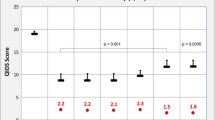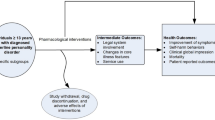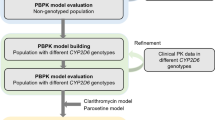Abstract
Purpose of Review
The utilization of pharmacogenetic (PGx) testing in psychiatry is emerging into clinical practice as the literature on drug-gene interactions continues to grow. Professionals in the field and the general public believe that it is beneficial to treatment, and overall hold very favorable perceptions regarding PGx use. A few studies have examined psychiatric patient attitudes toward PGx testing. We reviewed these studies and presented new data.
Recent Findings
We surveyed 256 psychiatric inpatients and outpatients being treated at a large psychiatric hospital. Very few patients have heard of PGx, but with only a brief description of PGx testing, a vast majority felt enthusiastic about it and believed that it could help them. More than two-thirds of patients surveyed believed that PGx testing can be useful to their doctors and a majority of the sample were willing to undergo PGx testing if their doctors order it. Patients who have previously heard of PGx testing more frequently reported that they believed PGx testing would be beneficial to them. The most frequently reported concerns of patients were related to the cost and insurance coverage for PGx testing.
Summary
Both previous studies and our data showed that patient attitudes toward PGx testing were positive and it would increase their confidence in medication treatment.




Similar content being viewed by others
Data Availability
Data is available upon request.
References
Papers of particular interest, published recently, have been highlighted as: • Of importance
Connolly KR, Thase ME. The clinical management of bipolar disorder: a review of evidence-based guidelines. Prim Care Companion CNS Disord. 2011;13:PCC.10r01097.
Kane JM, Leucht S, Carpenter D, Docherty JP, Expert Consensus Panel for Optimizing Pharmacologic Treatment of Psychotic Disorders. The expert consensus guideline series. Optimizing pharmacologic treatment of psychotic disorders. Introduction: methods, commentary, and summary. J Clin Psychiatry. 2003;64 Suppl 12:5–19.
Robinson DG, et al. Prescription practices in the treatment of first-episode schizophrenia spectrum disorders: data from the national RAISE-ETP study. Am J Psychiatry. 2015;172:237–48.
Correll CU, Kishimoto T, Kane JM. Randomized controlled trials in schizophrenia: opportunities, limitations, and trial design alternatives. Dialogues Clin Neurosci. 2011;13:155–72.
Lieberman JA, et al. Effectiveness of antipsychotic drugs in patients with chronic schizophrenia. N Engl J Med. 2005;353:1209–23.
Julius RJ, Novitsky MA, Dubin WR. Medication adherence: a review of the literature and implications for clinical practice. J Psychiatr Pract. 2009;15:34–44.
Zhang J-P, Malhotra AK. Pharmacogenetics and antipsychotics: therapeutic efficacy and side effects prediction. Expert Opin Drug Metab Toxicol. 2011;7:9–37.
Kato M, Serretti A. Review and meta-analysis of antidepressant pharmacogenetic findings in major depressive disorder. Mol Psychiatry. 2010;15:473–500.
Zhang J-P, et al. Pharmacogenetic associations of antipsychotic drug-related weight gain: a systematic review and meta-analysis. Schizophr Bull. 2016;42:1418–37.
Ravyn D, Ravyn V, Lowney R, Nasrallah HA. CYP450 pharmacogenetic treatment strategies for antipsychotics: a review of the evidence. Schizophr Res. 2013;149:1–14.
Hicks JK, et al. Clinical Pharmacogenetics Implementation Consortium (CPIC) guideline for CYP2D6 and CYP2C19 genotypes and dosing of selective serotonin reuptake inhibitors. Clin Pharmacol Ther. 2015;98:127–34.
Hicks JK, et al. Clinical Pharmacogenetics Implementation Consortium guideline for CYP2D6 and CYP2C19 genotypes and dosing of tricyclic antidepressants. Clin Pharmacol Ther. 2013;93:402–8.
Leckband SG, et al. Clinical Pharmacogenetics Implementation Consortium guidelines for HLA-B genotype and carbamazepine dosing. Clin Pharmacol Ther. 2013;94:324–8.
Drozda K, Müller DJ, Bishop JR. Pharmacogenomic testing for neuropsychiatric drugs: current status of drug labeling, guidelines for using genetic information, and test options. Pharmacotherapy. 2014;34:166–184. This article reviewed relevant information about PGx testing in psychiatric medication treatment.
Swen JJ, et al. Pharmacogenetics: from bench to byte–an update of guidelines. Clin Pharmacol Ther. 2011;89:662–73.
Abbasi J. Getting Pharmacogenomics Into the Clinic. JAMA. 2016;316:1533–5.
Walden LM, et al. Physicians’ opinions following pharmacogenetic testing for psychotropic medication. Psychiatry Res. 2015;229:913–8.
Kung S, Allen JD. Patients and Clinicians Report Higher-Than-Average Satisfaction With Psychiatric Genotyping for Depressed Inpatients. J Clin Psychiatry. 2011;72:13989.
Thompson C, Hamilton SP, Hippman C. Psychiatrist attitudes towards pharmacogenetic testing, direct-to-consumer genetic testing, and integrating genetic counseling into psychiatric patient care. Psychiatry Res. 2015;226:68–72.
Laegsgaard MM, Mors O. Psychiatric genetic testing: Attitudes and intentions among future users and providers. Am J Med Genet B Neuropsychiatr Genet. 2008;147B:375–84.
Kusic D, et al. Patient Perceptions and Potential Utility of Pharmacogenetic Testing in Chronic Pain Management and Opioid Use Disorder in the Camden Opioid Research Initiative. Pharmaceutics. 2022;14:1863.
Kastrinos A, Campbell-Salome G, Shelton S, Peterson EB, Bylund CL. PGx in psychiatry: Patients’ knowledge, interest, and uncertainty management preferences in the context of pharmacogenomic testing. Patient Educ Couns. 2021;104:732–8.
McCarthy MJ, et al. Attitudes on pharmacogenetic testing in psychiatric patients with treatment-resistant depression. Depress Anxiety. 2020;37:842–50.
Barr M, Rose D. The great ambivalence: factors likely to affect service user and public acceptability of the pharmacogenomics of antidepressant medication. Sociol Health Illn. 2008;30:944–58.
Liko I, Lai E, Griffin RJ, Aquilante CL, Lee YM. Patients’ perspectives on psychiatric pharmacogenetic testing. Pharmacopsychiatry. 2020;53:256–61.
Berrios C, et al. Parental understanding and attitudes following pharmacogenomic testing for pediatric neuropsychiatric patients. Pharmacogenomics. 2022;23:345–54.
Dunbar L, et al. Clinician experiences of employing the AmpliChip® CYP450 test in routine psychiatric practice. J Psychopharmacol (Oxf). 2012;26:390–7.
Bright D, Worley M, Porter BL. Patient perceptions of pharmacogenomic testing in the community pharmacy setting. Res Soc Adm Pharm. 2021;17:744–9.
Winner J, Allen JD, Altar CA, Spahic-Mihajlovic A. Psychiatric pharmacogenomics predicts health resource utilization of outpatients with anxiety and depression. Transl Psychiatry. 2013;3: e242.
Bradley P, et al. Improved efficacy with targeted pharmacogenetic-guided treatment of patients with depression and anxiety: a randomized clinical trial demonstrating clinical utility. J Psychiatr Res. 2018;96:100–107. This random clinical trial demonstrated clinical utility of PGx testing in guiding treatment of depression and anxiety.
Hall-Flavin DK, et al. Utility of integrated pharmacogenomic testing to support the treatment of major depressive disorder in a psychiatric outpatient setting. Pharmacogenet Genomics. 2013;23:535–48.
Olson MC, et al. Clinical impact of pharmacogenetic-guided treatment for patients exhibiting neuropsychiatric disorders: a randomized controlled trial. Prim Care Companion CNS Disord. 2017;19(2). https://doi.org/10.4088/PCC.16m02036.
Zhou Z-W, et al. Clinical association between pharmacogenomics and adverse drug reactions. Drugs. 2015;75:589–631.
Lanktree MB, et al. Positive perception of pharmacogenetic testing for psychotropic medications. Hum Psychopharmacol. 2014;29:287–91.
de Denus S, et al. An evaluation of pharmacists’ expectations towards pharmacogenomics. Pharmacogenomics. 2013;14:165–75.
Zhang SC, Bruce C, Hayden M, Rieder MJ. Public perceptions of pharmacogenetics. Pediatrics. 2014;133:e1258-1267.
Author information
Authors and Affiliations
Corresponding author
Ethics declarations
Conflict of Interest
Dr. Tamaiev, Mr. Bergson, Dr. Sun, Mr. Roy, and Ms. Desai report no potential conflict of interest.
Dr. Lencz is a consultant to Genomind Inc, and has received grant support from the National Institute of Mental Health, Brain & Behavioral Research Foundation, and the US-Israel Binational Science Foundation.
Dr. Malhotra has received grant support from the National Institute of Mental Health. Dr. Malhotra is a consultant to Genomind, Inc and Concert Pharma, and is on the advisory board of InformedDNA.
Dr. Zhang has received grant support from the National Institute of Mental Health, Brain & Behavioral Research Foundation, and Genomind, Inc.
Human and Animal Rights and Informed Consent
This article does not contain any studies with human or animal subjects performed by any of the authors.
Additional information
Publisher's Note
Springer Nature remains neutral with regard to jurisdictional claims in published maps and institutional affiliations.
Rights and permissions
Springer Nature or its licensor (e.g. a society or other partner) holds exclusive rights to this article under a publishing agreement with the author(s) or other rightsholder(s); author self-archiving of the accepted manuscript version of this article is solely governed by the terms of such publishing agreement and applicable law.
About this article
Cite this article
Tamaiev, J., Bergson, Z., Sun, X. et al. Patient Attitudes Toward Pharmacogenetic Testing in Psychiatric Treatment. Curr Behav Neurosci Rep 10, 30–40 (2023). https://doi.org/10.1007/s40473-023-00256-5
Accepted:
Published:
Issue Date:
DOI: https://doi.org/10.1007/s40473-023-00256-5




